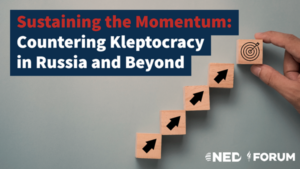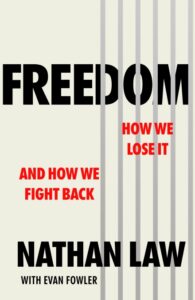The democratic world’s inability to cope with the resurgence of “Autocracy, Inc.” arises partly from its own internal weaknesses, some of which have been exacerbated, deliberately, by autocratic actors, says a leading commentator.
But maybe there is a lesson for us in this story, as well as a warning, notes Pulitzer Prize winning author Anne Applebaum. After all, if the leaders of the autocratic world are able to work together, to cooperate with one another; if they can help one another suppress internal opposition, teach one another how to use surveillance technology, then why can’t the democratic world also work together to push back against them? she asked the World Movement for Democracy’s 11th Assembly in Taipei, Taiwan, today (above):
 Here’s an example: many people in this room work on kleptocracy and corruption, and many are very good at exposing theft in high places, in their own countries. What if these projects could be internationalized, with work shared and amplified in many countries? What if investigators focused not only on their own countries, but on the connections between countries? What if we could find ways of telling that story in a manner that reaches more people, on the Youtube channels and social media accounts that we all share?
Here’s an example: many people in this room work on kleptocracy and corruption, and many are very good at exposing theft in high places, in their own countries. What if these projects could be internationalized, with work shared and amplified in many countries? What if investigators focused not only on their own countries, but on the connections between countries? What if we could find ways of telling that story in a manner that reaches more people, on the Youtube channels and social media accounts that we all share?
Such collaboration is not only possible but necessary and useful for digital and traditional human rights groups, argues Eduardo Ferreyra, a project leader at Asociación por los Derechos Civiles, a civil society organization based in Buenos Aires, Argentina. He outlines potential strategies to bridge the gap between the two communities at the International Forum’s Power 3.0 blog:
- Joining together in strategic litigation: Engaging jointly with state legal systems to uphold human rights may strengthen collaboration between both communities. Usually, strategic litigation involves complex legal cases where various fundamental rights are affected. Therefore, each group can contribute their own expertise to the lawsuit by focusing on aspects of the case in which they are knowledgeable. Buenos Aires’ facial recognition system is informative. A locally-based digital rights group—Argentine Computer Law Observatory (ODIA)—submitted a constitutional challenge to the system with the support of the Center for Legal and Social Studies (CELS)….
- Commission studies on emerging digital rights topics: If traditional organizations want to address the impact of technology on human rights, commissioning digital rights organizations to explore an issue relevant to their work is a great starting point. For instance, in 2018, the International Committee of the Red Cross (ICRC) commissioned Privacy International (PI) to study where surveillance may obstruct or threaten the impartial and independent nature of humanitarian action….
- Keeping tabs on elections: A digital rights organization may focus on disinformation about candidates that is spread via social media or online political advertising while their traditional counterparts may analyze the impact money has on elections and politics (as when the Carter Center examined the role of technology in Kenya’s 1922 presidential election).
- Promoting education, exchange, and training programs: Both communities should create joint fellowship programs providing digital rights defenders the opportunity to work in traditional human rights organizations, and vice versa. … For example, Ford Foundation partnered with the social impact firm Reboot to launch a technology fellows program. RTWT.
Applebaum, author of the book, “Twilight of Democracy,” insisted that democracy advocates collaborate in order to more effectively counter what she calls “Autocracy Inc,” a network of corrupt regimes and non-state actors which share resources and act as a support system for modern authoritarians.
“Today, the most brutal autocrats don’t care if their countries are criticized. Autocrats … are willing to pay the price of complete disaster, enter the category of failed states, accept economic collapse, & mass poverty to stay in power,” she told the Assembly.
 Hong Kong democracy activist Nathan Law said he believed Xi Jinping’s “one-man dictatorship” would be increasingly hard to predict and that the Chinese leader was becoming like Russian President Vladimir Putin, AFP reports.
Hong Kong democracy activist Nathan Law said he believed Xi Jinping’s “one-man dictatorship” would be increasingly hard to predict and that the Chinese leader was becoming like Russian President Vladimir Putin, AFP reports.
“They will value their personal ambition more than the stability of the country. So, it means that they could have more reckless moves in terms of really threatening Taiwan and threatening the world,” he said.
President Tsai Ing-wen said Taiwan’s people “have never shied away from the challenges of authoritarian interference… and fought against forces looking to undermine” its democracy.
“The challenge posed by authoritarian regimes is an important wake-up call for democrats worldwide,” she told the World Movement assembly, citing Russia’s invasion of Ukraine.
No sharper contrast between inspirational democracy & the lies & brutality of dictatorships than to compare Taiwan President Tsai Ing-wen’s uplifting speech to the 11th World Assembly of Democracy just now with the totalitarian power grab of Xi Jinping at the latest CPC Congress, Stanford University’s Larry Diamond tweeted.
So inspired by the opening ceremony of #WM11Assembly in Taipei: fantastic remarks by President Tsai @iingwen; our fantastic @MoveDemocracy steering committee inc Nobel Laureate & chair @mariaressa; being in democratic #Taiwan 🇹🇼surrounded by heroes ❤️🥟🧋 pic.twitter.com/SmQQEkK838
— Kelley Currie 🌻 (@KelleyCurrie) October 25, 2022
Democracy activists must collaborate across borders to combat networked authoritarians, @anneapplebaum tells @rapplerdotcom at @MoveDemocracy‘s #WM11Assembly https://t.co/wU4MfLexxW via @YouTube
— Democracy Digest (@demdigest) October 25, 2022







